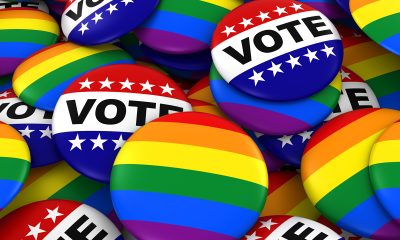Sports
New kickball league thriving in North Carolina
Stonewall Sports expands, finds eager players in unlikely places
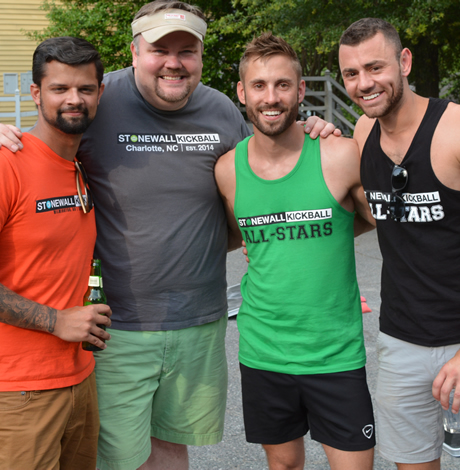
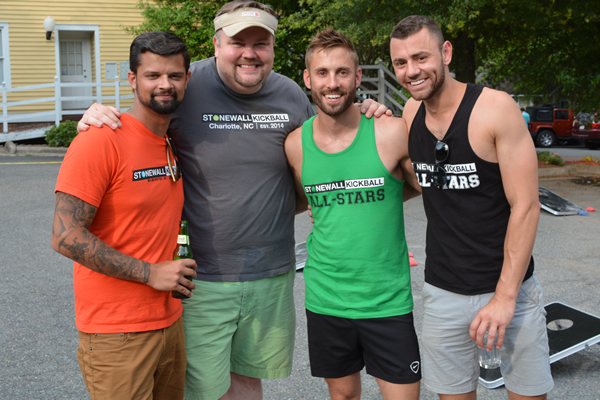
Four commissioners of Stonewall Kickball in North Carolina (l-r), Frank Wolfgram, Jason Boone, Will Fisher and Jonathan Melton. (Photo courtesy of Boone)
With an estimated metropolitan area population of six million, D.C. is home to a large and thriving LGBT sports community. There are roughly 35 teams and clubs competing, playing and socializing together, usually outside of the traditional bar scene. It seems that every time a new league is formed, it is immediately filled to capacity. In 2015, Capital Pride Volleyball and Stonewall Billiards completed their first seasons and will have to consider expanding for their second seasons.
The success in D.C. of these leagues can be attributed in part to the sheer number of people here, the transient nature of the area and the progressive thinking of many residents. Many of the LGBT players are having their own sports renaissance, finding their way back to the sports they were bullied out of playing in their youth and trying new sports.
But what about the rural areas around the country where homophobia remains prevalent and where there are still no safe spaces for members of the LGBT community to play sports?
Is it possible for LGBT sports leagues to be formed that offer that safe space when the numbers aren’t there and the local community may not be ready for it?
In the smaller communities, it all begins at the grassroots level.
D.C.-based Stonewall Sports has created a prototype for LGBT sports leagues that has worked well for the five sports that it offers locally. The structure that Stonewall mandates includes organizational guidelines for the proposed sport, financial support to local charities and community outreach.
North Carolina became the target of the first Stonewall expansion effort and leagues are now in place in Raleigh, Charlotte, Greensboro and Wilmington.
Even with the Stonewall prototype, getting started and maintaining the momentum to keep the leagues running requires establishing a strong connection to the community. Raleigh and Charlotte were the first expansion cities in 2013 and the two smaller cities followed.
Stonewall Kickball-Greensboro started in the fall of 2014 with 70 players on five teams. There were some issues at the beginning with teams being too small and having to forfeit, but they expanded to 107 players in the second season this year.
With the Greensboro population at just over 250,000, to get those extra players, kickball commissioner Will Fisher started networking and going out and just talking to people. They are also competing to recruit players with a straight recreational kickball league in the area.
“There is not really a gay scene here,” says Fisher. “And we don’t have a lot of options recruiting from the colleges as most of them aren’t over 21.”
Greensboro ended up with a diverse group of kickball players — mostly gay, several straight players, some recovering from addictions and a mix of ages.
“This is a lot of people that didn’t hang out together that are playing a sport and getting along fine,” Fisher says.
Sponsorship for the teams in the league has come from varied sources such as an investment firm, a Cross Fit gym, a catering business and a straight bar that caters to gay clientele on Sunday nights. Even a dinnerware replacement company is on board. The players can be found helping out at their sponsor’s events, doing set-up and break-down and the financial benefactor of their efforts is the local LGBT community center, Guilford Green.
The Stonewall prototype is working so well for them, that they are considering taking over volleyball from an old parks and recreation league.
Fisher, who is from Sanford, N.C., didn’t play many sports growing up but was active in eventing, an equestrian sport.
“This is fun and I am really enjoying meeting people that I wouldn’t have met otherwise,” says Fisher. “Actually, I think I might know everyone in Greensboro now.”
The launch of Stonewall Kickball-Wilmington in the spring of 2015 proved to be an even tougher challenge as the population in Wilmington is just over 100,000 people.
“There is no gay community here and most of the LGBT people in town don’t want to go to the only gay bar,” says Frank Wolfgram, Wilmington Kickball commissioner. “It’s a small town and even though no one really knows each other, you still hear about everyone’s business.”
With no Pride events in the area, marketing was a key issue and word began to spread that a kickball league was forming. It was decided that it was necessary to have a few pick-up kickball games to see if everyone meshed. There were enough players to start a league — 60 players on five teams.
“When we were first getting ready to play, I was thinking to myself, ‘please let everyone be nice to each other,'” Wolfgram says. “And they were; it was mind-blowing. Everyone was clapping and being really supportive.”
Wolfgram is from Rochester, N.Y., and has been in Wilmington for five years. He played basketball and baseball growing up and says he has always been a sports fan. With the next season approaching, Wolfgram is already starting to wonder if they will come up with enough players to keep it going.
“I probably shouldn’t worry too much about it,” he says. “People enjoy getting muddy here.”
The lesson from starting these leagues in small cities was that the community plays an extra large part in the success of the venture. The typical game day is filled with kickball, cornhole, kids, dogs and food.
“You have to wonder if the community is ready for 60 gays and their allies to walk into a bar all wearing matching T-shirts,” says Martin Espinoza, co-founder of Stonewall Sports. “One thing to note is that the new leagues in North Carolina all have young leaders who are interested in helping the community.”
Another positive development is that despite the physical distance between the four cities, they are forging a new community together. They are playing games, holding events and offering support to one another. This weekend they will all come together to spend a day at the Wet n’ Wild water park in Greensboro. Ten people from Stonewall-D.C. will be there to join in the fun.
“It has been pretty amazing to watch this tight community form from four cities,” Espinoza says. “They are always trying to one up each other. Greensboro even had the straight female mayor come out for the first pitch.”
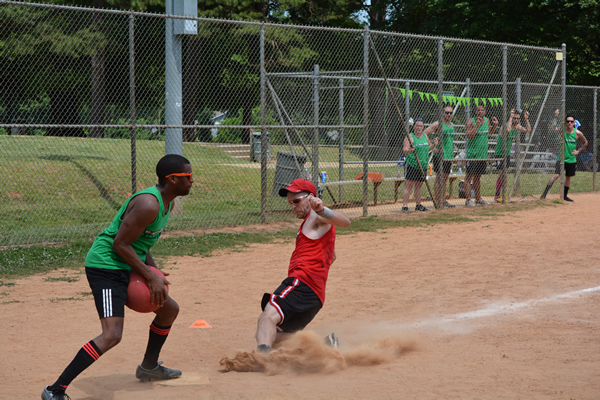
Sports
Bisexual former umpire sues Major League Baseball for sexual harassment
Brandon Cooper claims female colleague sexually harassed him

A fired former umpire is suing Major League Baseball, claiming he was sexually harassed by a female umpire and discriminated against because of his gender and his sexual orientation.
Brandon Cooper worked in the minor league Arizona Complex League last year, and according to the lawsuit he filed Wednesday in federal court in Manhattan, he identifies as bisexual.
“I wanted my umpiring and ability to speak for itself and not to be labeled as ‘Brandon Cooper the bisexual umpire,’” he told Outsports. “I didn’t want to be labeled as something. It has been a passion of mine to simply make it to the Major Leagues.”
But that didn’t happen. Instead of being promoted, he was fired. His suit names MLB and an affiliated entity, PDL Blue, Inc., and alleges he had endured a hostile work environment and wrongful termination and/or retaliation because of gender and sexual orientation under New York State and New York City law.
“Historically the MLB has had a homogenous roster of umpires working in both the minor and major leagues,” Cooper claims in his suit. “Specifically, to date there has never been a woman who has worked in a (regular) season game played in the majors, and most umpires are still Caucasian men. To try to fix its gender and racial diversity issue, defendants have implemented an illegal diversity quota requiring that women be promoted regardless of merit.”
Cooper claims former umpire Ed Rapuano, now an umpire evaluator, and Darren Spagnardi, an umpire development supervisor, told him in January 2023 that MLB had a hiring quota, requiring that at least two women be among 10 new hires.
According to the suit, Cooper was assigned to spring training last year and was notified by the senior manager of umpire administration, Dusty Dellinger, that even though he received a high rating in June from former big league umpire Jim Reynolds, now an umpire supervisor, that women and minority candidates had to be hired first.
Cooper claims that upon learning Cooper was bisexual, fellow umpire Gina Quartararo insulted him and fellow umpire Kevin Bruno by using homophobic slurs and crude remarks. At that time, Quartararo and Cooper worked on the same umpiring crew and being evaluated for possible promotion to the big leagues.
This season, Quartararo is working as an umpire in the Florida State League, one of nine women who are working as minor league umpires.
Cooper said he notified Dellinger, but instead of taking action against Quartararo, he said MLB ordered Cooper to undergo sensitivity training. According to his lawsuit, he was also accused of violating the minor league anti-discrimination and harassment policy.
Cooper’s suit says he met with MLB Senior Vice President of Diversity, Equity and Inclusion Billy Bean — who the Los Angeles Blade reported in December is battling cancer.
The lawsuit says at that meeting, Bean told the umpire that Quartararo claimed she was the victim, as the only female umpire in the ACL. Cooper said he told Bean Quartararo regularly used homophobic slurs and at one point physically shoved him. He also claims that he has video evidence, texts and emails to prove his claim.
But he said his complaints to Major League Baseball officials were ignored. His lawsuit said MLB passed him over for the playoffs and fired him in October. He said of the 26 umpires hired with Cooper, he was the only one let go.
Through a spokesperson, MLB declined to comment on pending litigation. Quartararo has also not publicly commented on the lawsuit.
Sports
Brittney Griner, wife expecting first child
WNBA star released from Russian gulag in December 2022
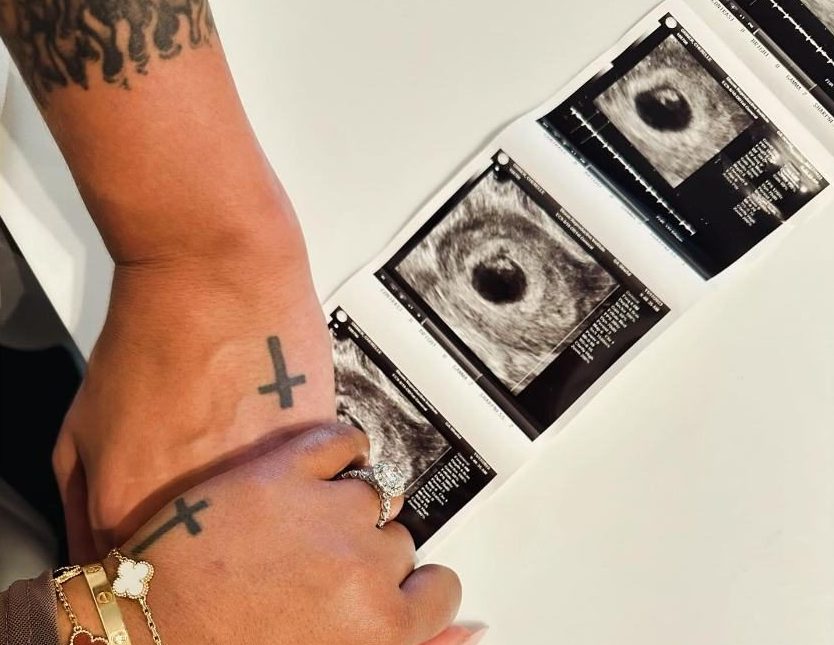
One year after returning to the WNBA after her release from a Russian gulag and declaring, “I’m never playing overseas again,” Phoenix Mercury star Brittney Griner and her wife announced they have something even bigger coming up this summer.
Cherelle, 31, and Brittney, 33, are expecting their first child in July. The couple shared the news with their 715,000 followers on Instagram.
“Can’t believe we’re less than three months away from meeting our favorite human being,” the caption read, with the hashtag, #BabyGrinerComingSoon and #July2024.
Griner returned to the U.S. in December 2022 in a prisoner swap, more than nine months after being arrested in Moscow for possession of vape cartridges containing prescription cannabis.
In April 2023, at her first news conference following her release, the two-time Olympic gold medalist made only one exception to her vow to never play overseas again: To return to the Summer Olympic Games, which will be played in Paris starting in July, the same month “Baby Griner” is due. “The only time I would want to would be to represent the USA,” she said last year.
Given that the unrestricted free agent is on the roster of both Team USA and her WNBA team, it’s not immediately clear where Griner will be when their first child arrives.
The Griners purchased their “forever home” in Phoenix just last year.
“Phoenix is home,” Griner said at the Mercury’s end-of-season media day, according to ESPN. “Me and my wife literally just got a place. This is it.”
As the Los Angeles Blade reported last December, Griner is working with Good Morning America anchor Robin Roberts — like Griner, a married lesbian — on an ESPN television documentary as well as a television series for ABC about her life story. Cherelle is executive producer of these projects.
Next month, Griner’s tell-all memoir of her Russian incarceration will be published by Penguin Random House. It’s titled “Coming Home” and the hardcover hits bookstores on May 7.
Sports
Applause and criticism for Staley’s trans-inclusive stance
South Carolina Gamecocks women’s coach made comments on Sunday
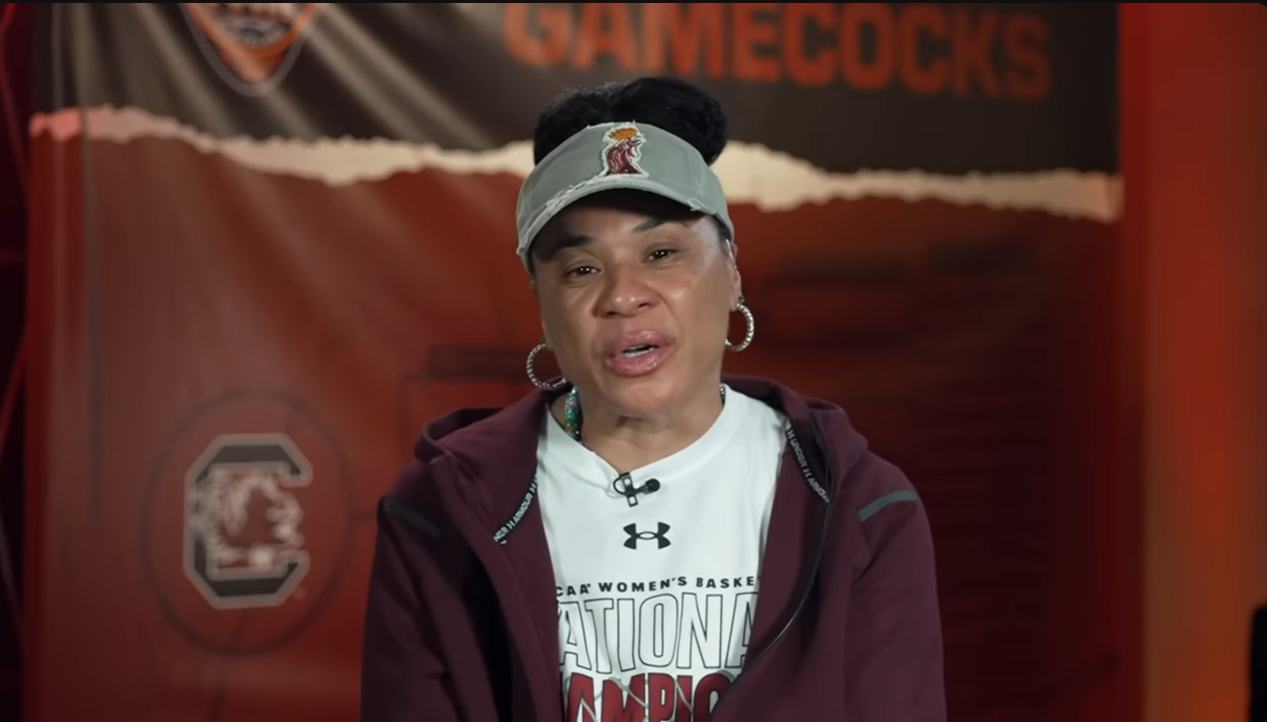
If not for a conservative transphobic blogger, this moment should be a celebration of NCAA women’s basketball coach Dawn Staley and the women of the South Carolina Gamecocks.
On Sunday, they concluded their undefeated season with a decisive win and a championship title. But when Staley faced reporters before that big game, Outkick’s Dan Zakheske asked her an irrelevant, clickbait question about transgender women in sports, referring to them as “biological males.”
Staley could have ignored the question, or stated she had no opinion, but instead the legendary coach offered a crystal clear endorsement of trans women competing in women’s sports, something outlawed in her home state of South Carolina for girls in kindergarten through college.
“I’m of the opinion,” said Staley, “If you’re a woman, you should play. If you consider yourself a woman and you want to play sports or vice versa, you should be able to play. That’s my opinion.”
Zakheske clearly wasn’t satisfied with that declaration of allyship and Staley swiftly cut him off.
“You want me to go deeper?” she asked.
“Do you think transgender women should be able to participate,” he started to say, when the coach stole the ball and took it downtown on a fastbreak. “That’s the question you want to ask? I’ll give you that. Yes. Yes. So, now the barnstormer people are going to flood my timeline and be a distraction to me on one of the biggest days of our game, and I’m okay with that. I really am.”
Staley is herself a Hall of Fame player a leading voice for diversity.
Reaction to her comments were swift, from LGBTQ rights organizations, athletes and inclusion opponents.
“Coach Staley simply spoke the truth that trans women are women and should play if they want,” said Sarah Kate Ellis, president and CEO of GLAAD, in a post on Instagram. “All of us can take a page from Coach Staley’s playbook as a sports leader and as a person of high integrity guided by faith, compassion and common sense.”
A White House pool reporter revealed President Joe Biden called Staley Sunday evening to congratulate her and the Gamecocks on their championship win. But it’s not clear if she and the president, an outspoken supporter of trans rights, discussed her remarks on trans athletes.
A number of Black leaders in the LGBTQ movement applauded Staley for taking a stand.
“Coach Staley has always been a trailblazer, but she’s also shown that true leadership is about advancing justice and equality for everyone,” said Human Rights Campaign President Kelley Robinson. “By expressing her full-throated support for transgender athletes’ inclusion in sports, she’s sending an important message — our shared humanity matters.
“Coach Staley showed courage and vulnerability, in choosing to answer the question and make a powerful statement of support for trans people on one of the biggest days and biggest stages in sports history,” said Kierra Johnson, executive director of the National LGBTQ Task Force, in a statement. “Not only does that make her a leader we can all aspire to like, it makes her a class act. She has etched her legacy in the history books with her play, her coaching, her heart and her smarts.”
In congratulating Staley on her championship title victory, Dr. David J. Johns, the CEO and executive director of the National Black Justice Coalition, also commended her for “her unwavering advocacy and support for transgender people in sports.”
“In a time when transgender athetes face unjust scrutiny, discrimination and exclusion from the National Association of Intercollegiate Athletics, her courage to speak truth to power and in support of inclusion and fairness sets a powerful example for us all, and is a testament to her integrity and compassion.”
The NBJC leader was referring to Monday’s announcement by the NAIA, the governing body of athletic programs at small colleges nationwide, voting 20-0 to essentially ban trans women from competing with other women beginning Aug. 1, as ESPN reported.
“It is a shocking and devastating development that the NAIA, an organization that has done so much to open doors, is now slamming those doors shut on transgender athletes,” said Sasha Buchert, Lambda Legal’s senior attorney and director of the organization’s nonbinary and trans rights project.
“Instead of standing up in support of transgender young people, the NAIA has simply turned its back on them — permanently depriving them of the benefits of competition. Would that they had the courage of victorious University of South Carolina women’s basketball coach Dawn Staley, who didn’t miss a beat in clarifying that transgender women should be able to play.”
However, praise for Staley’s stance was not universal.
Riley Gaines, failed former college swimmer and paid shill for the anti-inclusion organization, Independent Women’s Forum, called Staley “entirely incompetent or a sell-out” on Fox News. “Personally, I don’t think she believes what she said.”
Gaines has turned her fifth-place tie with out trans NCAA champion Lia Thomas into a career as a crusader against inclusion and a former advisor to the presidential campaign of Florida Gov. Ron DeSantis.
Val Whiting, a former Stanford University and professional women’s basketball player, tweeted her strong disagreement with Staley. “A lot of my basketball sisters feel differently but trans women do not belong in women’s sports. It’s not fair nor safe for biological women. There has to be another solution for trans women to be able to compete athletically besides having them compete against biological women.”
A lot of my basketball sisters feel differently but trans women do not belong in women’s sports. It’s not fair nor safe for biological women. There has to be another solution for trans women to be able to compete athletically besides having them compete against biological women.
— Val Whiting (@iamcoachval) April 7, 2024
Zaksheske’s Outkick colleague, anti-trans pundit David Hookstead, also went all-in with a transphobic post.
“Dawn Staley says she supports men who identify as women competing against real women in sports. Her view could literally destroy women’s basketball forever. Why won’t more people stand up for women?”
Dawn Staley says she supports men who identify as women competing against real women in sports.
— David Hookstead (@dhookstead) April 6, 2024
Her view could literally destroy women’s basketball forever.
Why won’t more people stand up for women? pic.twitter.com/2A59KTqvHb
Hookstead then boasted that Staley blocked his account.
Republican South Carolina Congresswoman Nancy Mace retweeted Zaksheske’s account of his interaction with Staley, calling her support of trans athletes “absolute lunacy.” That in turn won praise from Caitlyn Jenner, who retweeted Whiting and posted her thanks to Mace, along with this comment: “There is nothing complicated about this issue!”
What is complicated is that Jenner has never explained why she has competed with cisgender women in golf ever since her transition almost a decade ago.
You’re a hypocrite. pic.twitter.com/42DKwA9jmF
— Art Candee 🍿🥤 (@ArtCandee) April 7, 2024
-

 State Department3 days ago
State Department3 days agoState Department releases annual human rights report
-

 Maryland5 days ago
Maryland5 days agoJoe Vogel campaign holds ‘Big Gay Canvass Kickoff’
-

 Politics4 days ago
Politics4 days agoSmithsonian staff concerned about future of LGBTQ programming amid GOP scrutiny
-

 District of Columbia1 day ago
District of Columbia1 day agoCatching up with the asexuals and aromantics of D.C.



